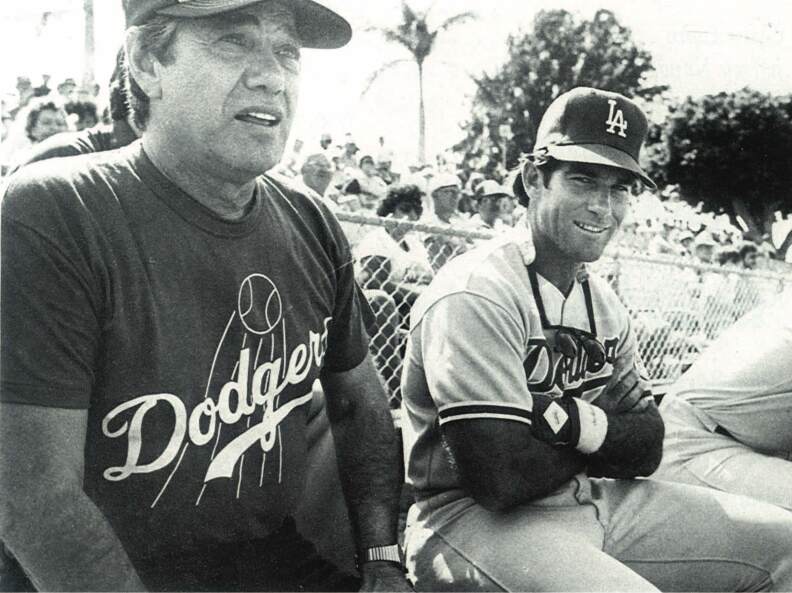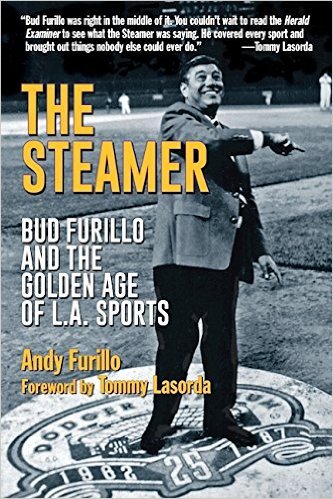Bud "The Steamer" Furillo was the long-time sports editor of the Los Angeles Herald Examiner.
He started his sports journalism career in L.A., before the Lakers and Dodgers ever moved here. He had seen and covered it all in his column called The Steam Room, which led to his nickname, The Steamer.

His son Andy Furillo had a front row seat for all of it. Furillo's new book about his father is called, "The Steamer: Bud Furillo and The Golden Age of L.A. Sports."

Andy Furillo joined host A Martinez to talk about the book, and his father's legacy in L.A. sports media.
Interview highlights
On how the media fit into L.A.'s small-town sports landscape of the 1940s:
"In that era, it was nothing like it is today. Sports were on a more, I would say, real scale in terms of the rest of life. You know, the country was coming off of World War II and it knew what was important, and what was trivial, and sports were a diversion. Newspapers were king, radio was very, very small at that time, television was just beginning to blink. So the newspapers were huge, and the newspapers kind of served to connect the teams and the athletes to the fans."
How and why he decided to write a book about his father:
"When I first got started, there were a number of different ways I could have gone. I could have gotten into the, 'Me and my father' type thing... you know, no, he wasn't that kind of a guy. So I was kind of like, OK, we've got to do a little bit about who my pop is, who's The Steamer, what is The Steam Room, what does it mean here. But then I thought, it had to be not so much about him, but about the era that he wrote the column The Steam Room. I could have gone further into his career into radio, but that's too much, it's too much, and probably more than people would've wanted to know about him. I think that that 15-year period, from 1959-1974 when he wrote The Steam Room column really was a remarkable period in terms of L.A. sports with the Dodgers, and USC, and UCLA, and the Rams were such a great story even though they didn't win championships. The Lakers were a great story, and they finally broke through after all the heartbreak with the Celtics and the Knicks, and the horse racing was just really colorful, the local fight scene was just spectacular. You know, Ali got his career launched here, the AFL, its birth was as much rooted in L.A. as any place. The first Super Bowl was here. I had to make choices, and the choice that I made was it's going to be about the era, and his view of that era, and using him as a lens to show the reader what it was like with this one guy, one terrific writer, columnist, newspaper man, journalist — human being, just his take on all these great things that happened."
What Andy wants people to know about his dad's story:
"In the course of doing this research on this era, pretty much anything that had been written in the last 25 years about that era only cites the LA Times as a source. The LA Times is a very good source, don't get me wrong. But there were other sources, and The Herald Examiner was a spectacular source, and my dad was a great source to get a take on what sports were like in L.A. in that period, and people needed to be reminded about that, and his legacy needed to be established, and I felt very strongly in the course of doing this that that had to be laid down. It had to be memorialized, what he did, because when you talk about somebody that really came from nowhere, came out of nowhere, came from not much, what any person can accomplish when you work hard, and you've got some smarts, and you can think on your feet, and if you follow your passion. That's one thing my dad did, he really, really followed his passion. He really wanted to be around sports, he really wanted to be the sports editor of that paper, he was very determined in what he did, he worked very hard and he came out of it a pretty accomplished guy."



